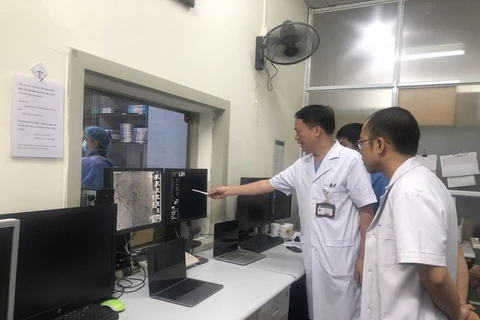 The 27th ASEAN Federation of Cardiology Congress (AFCC 2023) opens in Hanoi on November 3. (Photo: Nhandan online)
The 27th ASEAN Federation of Cardiology Congress (AFCC 2023) opens in Hanoi on November 3. (Photo: Nhandan online) Hanoi (VNA) – The 27th ASEAN Federation of Cardiology Congress (AFCC 2023) opened in Hanoi on November 3, bringing together over 2,000 domestic and foreign delegates, including about 300 leading cardiologists as guest speakers from ASEAN and around the world.
This is the second time Vietnam has hosted the congress - an annual prestigious scientific forum for cardiologists in the region and around the world.
Theme "Cardiology at the Crossroads: Challenges and Opportunities", the AFCC 2023, hosted by the Vietnam National Heart Association (VNHA) , focus on cardiovascular disease management in the context of multiple comorbidities, based on newly advanced interventions & technology, artificial intelligence, and telemedicine.
The congress, which runs November 5, includes more than 80 scientific sessions with 750 reports to be presented.
Cardiovascular diseases are the leading cause of death globally, claiming 19.5 million lives each year, accounting for about one-third of deaths from all causes, according to the 2022 Global Burden of Disease report.
The number of people suffering from and dying of cardiovascular diseases is increasing rapidly in low- and low-middle-income countries, accounting for 75% of total deaths, including countries in Southeast Asia.
Along with lifestyle changes and population aging, the burden of cardiovascular diseases is increasing in ASEAN members.
According to the World Heart Federation, it is estimated that each year, about 4 million people in the ASEAN region die from cardiovascular diseases. In Vietnam, about 200,000 people die from cardiovascular diseases each year, accounting for 33% of deaths.
Addressing the congress, Minister of Health Dao Hong Lan highlighted that Vietnam has issued documents on people's health care, with a focus on preventing and controlling non-communicable diseases.
She called on cardiologists in Southeast Asia be cohesive, share valuable experiences in clinical practice, and bring ASEAN cardiology on par with developed countries in the world.
She asked the Vietnam National Heart Association and relevant agencies to strengthen the prevention and control of non-communicable diseases, notably cardiovascular diseases./.























